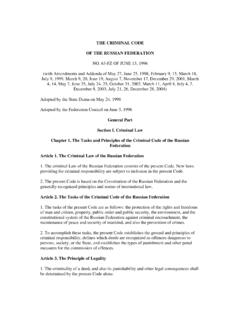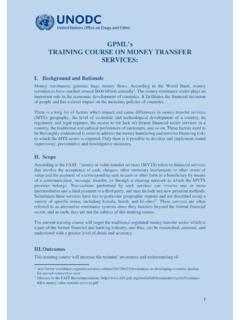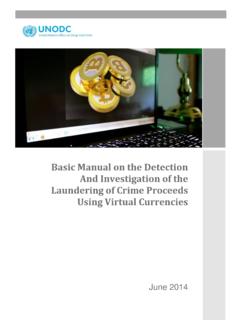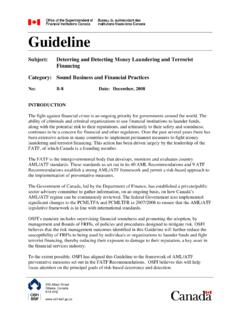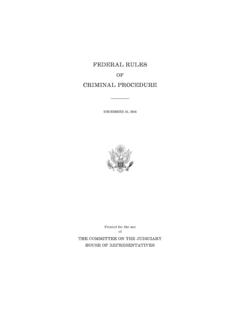Transcription of Russian Federation Criminal Procedure Code - IMOLIN
1 Criminal -PROCEDURAL code OF THE Russian Federation NO. 174-FZ OF DECEMBER 18, 2001 (with the Amendments and Additions of May 29, July 24, 25, October 31, 2002, June 30, July 4, 7, December 8, 2003, April 22, June 29, December 2, 28, 2004, June 1, 2005) This code comes into force as of July 1, 2002, with the exception of the provisions, for which other dates and Procedure for putting into operation are established by Federal Law No. 177-FZ of December 18, 2001 Passed by the State Duma on November 22, 2001 Approved by the Federation Council on December 5, 2001 Part One. General Provisions Section I. Basic Provisions Chapter 1. Criminal -Procedural Legislation Article 1. Laws Defining the Procedure for Criminal Court Proceedings 1.
2 The Procedure for Criminal court proceedings on the territory of the Russian Federation is established by the present code , based on the Constitution of the Russian Federation . 2. The Procedure for Criminal court proceedings, established by this code , is obligatory for courts, prosecutor's offices, preliminary investigation and inquiry bodies, as well as for other participants in the Criminal court proceedings. 3. The generally recognized principles and norms of international law and international treaties of the Russian Federation make up a component part of the legislation of the Russian Federation regulating Criminal legal proceedings. If an international treaty of the Russian Federation has laid down the rules different from those stipulated by the present code , the rules of the international treaty shall be applied.
3 Article 2. Operation of the Criminal Procedural Law in Space 1. Proceedings on a Criminal case on the territory of the Russian Federation , regardless of the place of committing the crime, shall be conducted in conformity with this code , unless otherwise stipulated by an international treaty of the Russian Federation . 2. The norms of the present code shall also be applied in the Procedure on a Criminal case for a crime committed on an air, sea or river vessel, flying the Flag of the Russian Federation , and outside the territory of the Russian Federation , if the said ship is registered in a port of the Russian Federation . Article 3. Operation of the Criminal Procedural Law with Respect to Foreign Citizens and Stateless Persons 1.
4 Proceedings on the Criminal cases, committed on the territory of the Russian Federation by foreign citizens or by stateless persons shall be conducted in conformity with the rules of the present code . 2. Procedural actions stipulated by the present code with respect to the persons enjoying diplomatic immunity, shall be conducted only at the request of the said persons or with their consent, which shall be inquired after through the Ministry of Foreign Affairs of the Russian Federation . Article 4. Operation of the Criminal -Procedural Law in Time In proceedings conducted in a Criminal case, there shall be applied Criminal -procedural law, operating during the performance of the corresponding procedural action or during the adoption of a procedural decision, unless otherwise is established by the present code .
5 Article 5. Principal Concepts Used in this code Unless otherwise specified, the principal concepts, used in the present code , shall have the following meaning: 1) alibi - the suspect's or the accused person's being in a different place at the moment when the crime is committed; 2) appeals instance - the court examining Criminal cases on appeal upon complaints and presentations, filed against the sentences and rulings of the court which have not yet come into legal force; 3) close persons - other persons not including close relatives and relations maintaining a relationship with the victim or with the witness, as well as persons, whose life, health and welfare mean a lot to the victim or to the witness because of existing personal relations; 4) close relatives - husband, wife, parents, children, adopters, the adopted, blood brothers and sisters, grandfather, grandmother and grandchildren; 5) verdict - the decision as to whether the man on trial is guilty or not guilty, passed by a college of jurors.
6 6) public prosecutor - an official of the prosecutor's office acting for the prosecution in the name of the state in a court hearing of a Criminal case, and on the prosecutor's instructions and in cases when the preliminary investigation has been completed in the form of an enquiry - also an enquirer or investigator; 7) enquirer - an official of the body of enquiry, possessing the legal right or authorized by the head of the body of enquiry to conduct the preliminary inquisition in the form of an inquest, and also the other powers specified in the present code ; 8) enquiry - the form of the preliminary inquisition, carried out by the enquirer (investigator) on a Criminal case for which the conducting of the preliminary investigation is not obligatory; 9) pre-trial Procedure - Criminal court proceedings as from the moment of receiving a communication on the crime up until the prosecutor directing the Criminal case to the court to be examined on the merits.
7 10) living quarters - an individual dwelling house with all the residential and non-residential premises included with it, living premises regardless of form of ownership, included in the housing fund and used for permanent or temporary residence, as well as some other building or structure, not included into the housing fund but used as a temporary residence; 11) detention of the suspect - the measure of the procedural coercion, applied by the body of inquiry, by the inquirer, the investigator or the prosecutor for a term of not over 48 hours as from the moment of the actual detention of the person on the suspicion of his having committed a crime; ) a court's opinion - a conclusion on the presence or absence of components of a crime in actions of the person in respect of which special Criminal proceedings are applicable; 12) legal representatives - the parents, adopters, guardians or trustees of a minor suspect, of the accused or of the victim and the representatives of the institutions or organizations into whose care the minor suspect, the accused or the victim is placed, agencies of custody and guardianship; 13) selection of a measure of restriction - the adoption by the inquirer, the investigator or the prosecutor, as well as by the court, of the decision on the measure of restriction with respect to the suspect orto the accused.
8 14) cassation instance - the court examining on appeal Criminal cases upon the complaints and presentations against the sentences, rulings and resolutions of the first instance and of the appeals instance court, which have not yet entered into legal force; ) control over telephone and other talks - tapping and recording conersations by using any communication means, examination of, and listening to, phonograms; 15) moment of the actual detention - the moment when the person, suspected of committing a crime, is actually deprived of the freedom of movement in conformity with the Procedure , established by the present code ; 16) supervisory instance - the court, considering Criminal cases by way of supervision upon the complaints and presentations against sentences, rulings and resolutions of the courts, which have entered into legal force; 17) head of a body of inquest - the official of a body of inquest, including deputy head of a body of inquest authorized to give orders to carry out an inquest and urgently investigative actions provided for by this code ; 18) head of the investigation department - the official, leading the corresponding investigation subdivision, as well as his deputy.
9 19) urgent investigative actions - the actions performed by the body of inquiry after the institution of a Criminal case, for which a preliminary investigation is obligatory, in order to expose and fix the signs of the crime, as well as the proof requiring an immediate certification, seizure and study; 20) non-complicity - the unestablished complicity or the established non-complicity of the person in the perpetration of a crime; 21) night time - an interval of time from 22:00 to 6:00 local time; 22) charge - the statement about the perpetration by a definite person of an action, prohibited by Criminal law, put forward in accordance with the Procedure established by the present code ; 23) ruling - any kind of decision, with the exception of a sentence, collectively passed by the first instance court in conducting legal proceedings on a Criminal case, as well as the decision passed by a higher placed court, with the exception of the court of appeals or of the supervisory instance, when the corresponding court decision is revised; 24) bodies of inquiry - state bodies and officials authorized in conformity with the present code to carry out an inquest and to exercise other procedural powers; 25) resolution - any kind of decision, with the exception of the sentence, passed by a judge on his own.
10 The decision, passed by the presidium of the court when the court decision, which has come into legal force, is revised; the decision of the prosecutor, investigator or inquirer, taken when carrying out a preliminary investigation, with the exception of the conclusion of guilt or a bill of indictment; 26) president of the court - the judge who is leading a court session in the collegiate examination of a Criminal case, as well as the judge, considering a Criminal case on his own; 27) presentation - the act of the prosecutor's response to the court decision, made in accordance with the Procedure established by the present code ; 28) sentence - the decision on whether the person on trial is or is not guilty, or on his relief from the punishment, passed by the court of the first or of the appeals instance; 29) application of a measure of restriction - the procedural actions, performed as from the moment of adopting the decision on selecting a measure of restriction and until it is cancelled or modified; 30) juror - the person, drawn into the participation in the court proceedings and into delivering a verdict in conformity with the Procedure , established by the present code .
